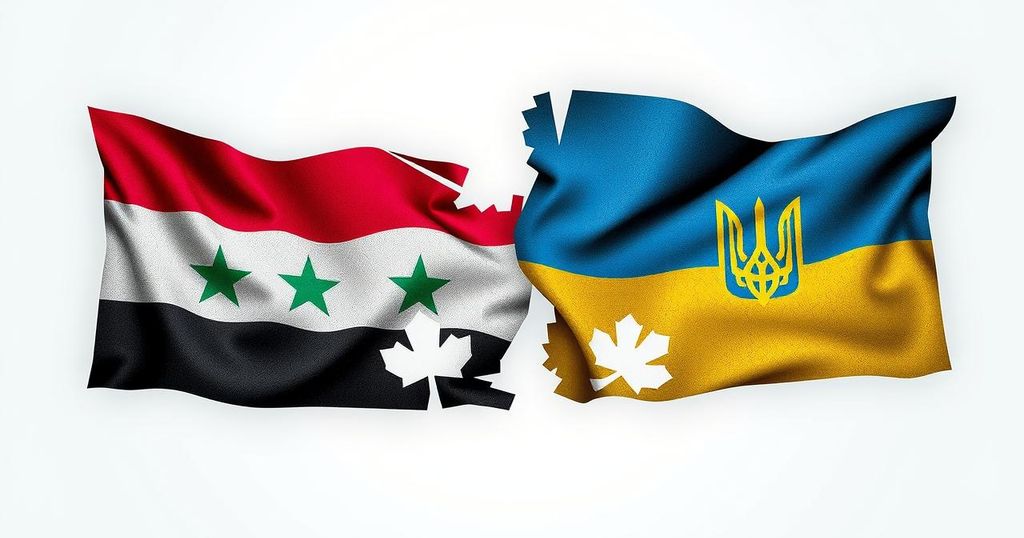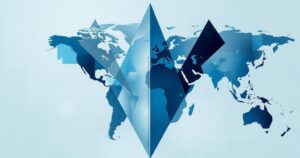Syria Pursues Strategic Partnerships with Ukraine Amid Evolving Relations

Syria’s new Foreign Minister Asaad Hassan al-Shibani announced intentions to form strategic partnerships with Ukraine, marking a significant shift in foreign relations amidst declining Russian influence. Concurrently, Ukraine is set to increase humanitarian food aid to Syria, signaling a potential foundation for future cooperation between the two nations.
In a significant shift in relations, Syria expressed a desire for strategic partnerships with Ukraine, articulated by Syria’s new Foreign Minister Asaad Hassan al-Shibani during a visit with his Ukrainian counterpart, Andrii Sybiha. This development comes as Kyiv aims to strengthen ties with the newly established Islamist leadership in Syria, amidst diminishing Russian influence. Al-Shibani emphasized that these partnerships would span political, economic, social, and scientific domains, highlighting the shared experiences and struggles faced by both nations due to prolonged conflict.
Concurrent with these diplomatic overtures, Ukraine pledged to escalate its humanitarian assistance to Syria, committing to additional shipments of food aid following the arrival of 20 shipments of flour. President Volodymyr Zelenskiy announced last week the initiation of this aid, amounting to 500 metric tons of wheat flour, as part of Ukraine’s humanitarian initiative in collaboration with the United Nations World Food Programme. This gesture signifies Ukraine’s intention to alleviate the hardships faced by Syrians as they navigate their crisis.
The backdrop of these developments is marked by the changing dynamics of Russian influence in the region. Traditionally, Syria relied on Russian wheat imports, however, recent uncertainties regarding Syria’s new government and payment issues have complicated these arrangements. The recent governmental changes, catalyzed by the Islamist group Hayat Tahrir al-Sham, raise questions about the future of Russian military installations in Syria, particularly the Hmeimim airbase and Tartous naval facility. Russian Foreign Minister Sergei Lavrov noted that discussions regarding the status of these military bases will be held with the new Syrian leadership, emphasizing the need for ongoing dialogue.
This evolving relationship between Syria and Ukraine reflects broader geopolitical changes, positioning Ukraine as a potential key player in the region and offering a glimpse of new alliances forming amid a backdrop of shifting powers. As both nations navigate their respective challenges, their increased cooperation may lead to new economic and humanitarian avenues, further influencing the landscape of Middle Eastern politics.
The relationship between Syria and Ukraine has gained attention amidst significant geopolitical shifts. Historically, Syria has been closely aligned with Russia, particularly during the presidency of Bashar al-Assad, who relied on Moscow for political support and military assistance during the Syrian Civil War. However, the recent rise of Hayat Tahrir al-Sham represents a substantial change in Syrian governance, impacting foreign relations. Ukraine’s agricultural output and its initiative to provide food aid to Syria indicate a strategic pivot towards humanitarian diplomacy, countering the declines in Russian influence over Syria’s international partnerships. The evolving diplomatic landscape suggests potential opportunities for Ukraine to expand its role in the region and establish new alliances, particularly in light of recent geopolitical tensions.
In summary, the strengthening ties between Syria and Ukraine represent a notable shift in the geopolitical landscape of the region. As Syria seeks to establish strategic partnerships with Ukraine—spanning various sectors—Kyiv responds with increased humanitarian aid in its commitment to support the Syrian population. With diminishing Russian influence, both nations may find new pathways to collaborate, potentially redefining the future of their respective positions within Middle Eastern politics and international relations.
Original Source: www.hindustantimes.com






